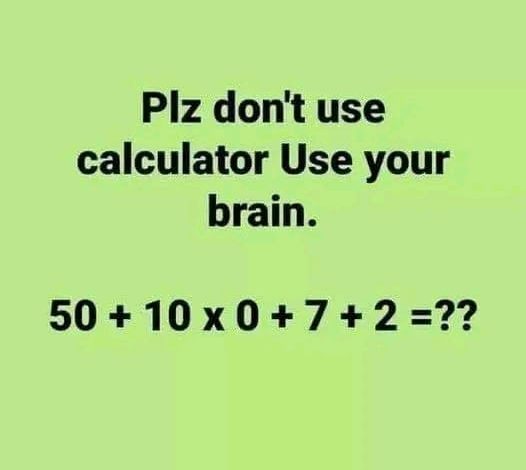The Power of Mental Math: Embracing Numeracy without Calculators

ADVERTISEMENT
The Power of Mental Math: Embracing Numeracy without Calculators
Introduction:
In an era dominated by digital devices, the humble practice of mental arithmetic remains a critical educational and cognitive tool. The image in question promotes the use of mental math over calculators, posing a simple arithmetic problem intended to encourage the mental calculation abilities of its viewers. This prompts a deeper examination of the benefits and implications of relying on one’s mental faculties for solving mathematical problems.
Discussion: The problem presented, “50 + 10 x 0 + 7 + 2,” serves as more than just a numerical query; it is a litmus test for one’s understanding of the order of operations—a fundamental concept in arithmetic. According to the standard mathematical rules, known by the acronym PEMDAS (Parentheses, Exponents, Multiplication and Division (from left to right), Addition and Subtraction (from left to right)), the solution to the problem unfolds as follows:
- Multiplication First: The operation 10 x 0 equals 0.
- Proceed with Addition: Then, 50 + 0 + 7 + 2 is calculated sequentially from left to right.
- Final Sum: The sum totals 59.
This exercise highlights the importance of understanding and applying the order of operations correctly, a skill that can be overshadowed by the over-reliance on calculators. Calculators, while efficient, remove the need to engage actively with the foundational principles of arithmetic, potentially leading to a superficial understanding of how results are derived.
ADVERTISEMENT
Benefits of Mental Math: Engaging in mental arithmetic enhances cognitive abilities such as memory, concentration, and problem-solving skills. It encourages numerical fluency and agility, allowing individuals to handle numbers with confidence and precision in everyday contexts—from shopping and cooking to budgeting and beyond. Moreover, mental math plays a significant role in early educational settings, laying the groundwork for more complex mathematical concepts introduced in higher education.
Challenges and Considerations: Despite its benefits, the practice of mental math faces challenges, particularly with the ubiquity of digital tools. There is a growing dependency on technology for basic calculations, which can inhibit the development of deeper mathematical understanding and critical thinking skills. Educators and parents must balance the use of technological aids with traditional calculation methods to foster a holistic mathematical education.
Conclusion: The encouragement to avoid calculators and engage in mental arithmetic, as depicted in the image, is more than a nostalgic return to traditional techniques; it is a call to strengthen cognitive processes that are vital in both academic and everyday settings. By embracing the challenges of mental math, individuals can enhance their cognitive flexibility, improve their numerical literacy, and better navigate a world governed by numbers.
This essay encourages reflection on how modern society engages with technology in learning environments and the importance of maintaining a strong foundation in basic arithmetic skills.
ADVERTISEMENT




